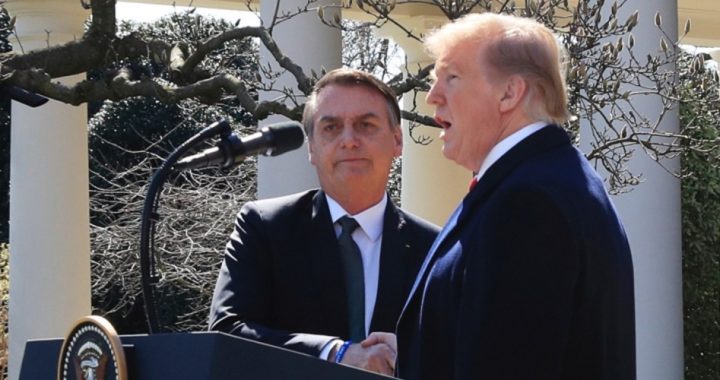
New Brazilian president Jair Bolsonaro made his first official visit to the White House on Tuesday. The meeting between the leaders of the two most populous nations in the Western Hemisphere caused some in the mainstream media to sarcastically wax poetic about a possible “bromance” between the two leaders.
Dubbed “far-right” and the “Trump of the Tropics” by media elites, Bolsonaro ran a decidedly pro-America, pro-Trump and anti-establishment campaign in 2018, which many described as “Trump-like.” He was elected on October 28 in a run-off election against former Sao Paulo Mayor Fernando Haddad with more than 55 percent of the vote.
President Trump had high praise for Bolsanaro, saying that the friendship they’re forming will be good for both countries. “I know that we’re going to have a fantastic working relationship. We have many views that are similar. And we certainly feel very, very true to each other on trade. I think Brazil’s relationship with the United States, because of our friendship, is probably better than it’s ever been by far.”
During a joint news conference in the Rose Garden, Trump said that he would designate Brazil a major non-NATO ally and hinted he might even back a campaign to make the South American country an actual NATO ally.
“As I told President Bolsonaro, I also intend to designate Brazil as a “Major Non-NATO ally,” or even possibly, if you start thinking about it, maybe a NATO ally,” the president said, adding that such a development would “greatly advance security and cooperation between our countries.”
Trump admitted that, “he’d have to talk to a lot of people,” before any formal NATO membership could be discussed. Under Article 5 of the North Atlantic Treaty, NATO members “agree that an armed attack against one or more of them … shall be considered an attack against them all.” Therefore, the expansion of NATO (from 12 nations at the time of its founding in 1947 to 29 today) also expands the number of countries that the United States has agreed to defend via this military alliance.
Bolsanaro, a former army captain, gushed with praise for both the president and America and hopes to change Brazil much like he believes Trump has changed America.
“I have always admired the United States of America. And this sense of admiration has just increased after you took office,” Bolsanaro said, through an interpreter.
“Brazil and the United States are tied by the guarantee of liberty, respect for traditional family, the fear of God our creator, against gender identity, political correctness and fake news,” Bolsonaro said, in a sound-byte certain to inflame the leftwing media.
Later, Trump joked, “I’m very proud to hear the president use the term ‘fake news.’”
After decades of leftist, anti-American governments, Bolsanaro is looking to forge a new relationship of mutual respect and trust. “Brazil does have a president who is not anti-American, which is really unprecedented in the past few decades.”
Both leaders touched on Venezuela and the humanitarian crisis in that country, which is on Brazil’s northern border. Both called on socialist strongman Nicolas Maduro to step down in favor of Juan Guaido, the interim president.
“Brazil has been an extraordinary leader in supporting the Venezuelan people’s efforts to reclaim their liberty and their democracy,” Trump said. “Along with the United States, Brazil was one of the first nations to recognize Venezuela’s legitimate interim President Juan Guaido.”
Bolsonaro agreed. “Reestablishing democracy in Venezuela is also a shared interest between our two administrations. The dictatorial regime in Venezuela today is part of a broader international coalition known as the “Sao Paulo Forum,” Bolsanaro said. “By democratic means, we were able to rid ourselves of that project in Brazil.”
In an interview with Fox News on Monday, Bolsonaro also expressed agreement with the Trump administration’s stance on immigration. “We do agree with President Trump’s decision or proposal on the wall,” Bolsonaro said. “The vast majority of potential immigrants do not have good intentions. They do not intend to do the best or do good to the U.S. people.”
On Tuesday, Bolsonaro apologized for that heavy-handed remark, saying, “I meant to say that a little part who immigrate don’t have good intentions and I made a mistake. I apologize for that.”
Like Trump, Bolsonaro can be a little “loose” with his rhetoric at times. But in this age of instant media and faux outrage over political correctness, it’s refreshing to see a leader who actually says what he thinks, instead of always carefully parsing his words, so as not to offend anyone.
The global mainstream media — so agenda driven and so in favor of globalism — dislikes Bolsonaro. As much as anything, that’s a reason to like him.
Photos of Presidents Jair Bolsonaro and Donald Trump: AP Images




